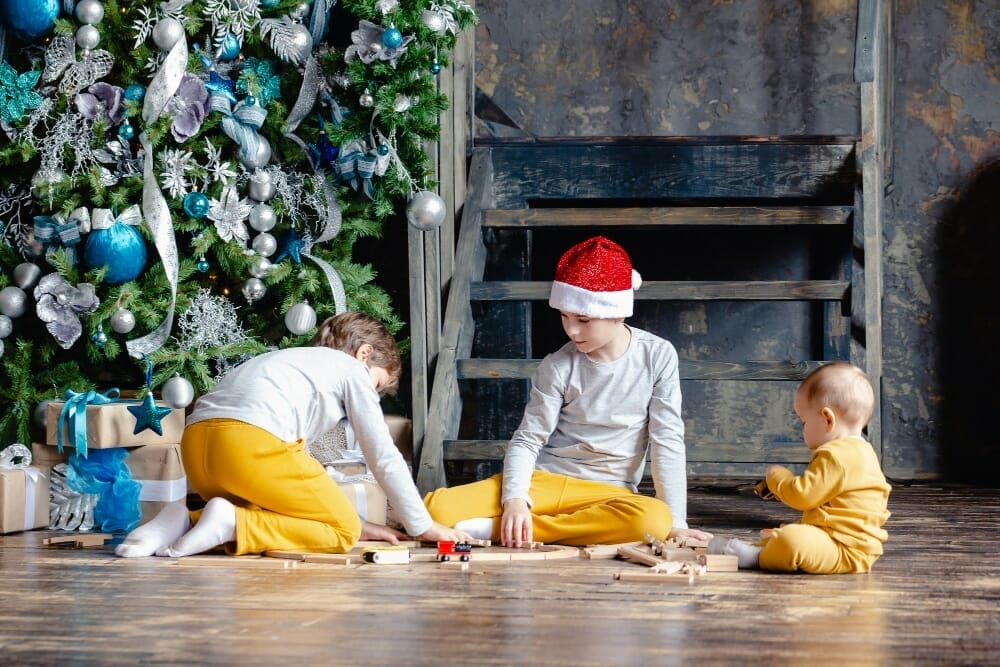With the holidays right around the corner, shopping for the little ones in your life can feel overwhelming at times. Having a better understanding of your child’s stage of play and developmental abilities for their age can help make the process a bit easier!
Play is a child’s primary occupation and how they make sense of their world. The act of playing helps to promote physical, social, emotional, and cognitive growth in a multitude of ways. Play provides novel ways for children to challenge their problem-solving and creativity skills while supporting overall development and well-being.
When choosing a toy or game for a child, it is important to consider what occupational therapists like to call the “just right challenge.” This means, a toy or game should not be so difficult to the point where it feels unachievable. However, the activity should also not be so easy to the point where it is not beneficial for a child. By following this concept and choosing developmentally appropriate toys, we can empower children and help them continually build upon their strengths and abilities.
Infants (~0-2 years)
At this age, babies are learning about their bodies and the cause and effect of their actions through exploratory and sensory-rich play (i.e., sound, touch, movement, vision). You will often see babies playing with their hands or feet in an attempt to understand how their body moves. Children typically engage in solitary play at this age, where they are not fully interested in playing with others just yet. Some great toys and activities for this stage include:
· Rattles
· Mobiles
· Mirror play
· Peek-a-boo
· Sing along songs/toys that make sounds
· Oral motor/teething toys
· Squeeze toys
· Pull toys
· Shape sorters
· Imitation toys (i.e., telephone, hammer)
Toddlers and Preschoolers (~2-4 years)
Parallel and associative play start to become more apparent by pre-school age when children enjoy engaging in similar play alongside or near others but not necessarily with others. Imitation and pretend play are also extremely important at this stage (i.e., role-playing, practicing social skills). Additionally, children are starting to develop their fine motor and hand-eye coordination skills, which are also essential for functional development.
· Block towers
· Stacking toys
· Puzzles
· Pegboards
· Shape sorters and activity cubes
· Imitation toys (i.e., telephone, hammer)
· Balls
· Water and sandbox play
· Lacing beads
· Dolls, stuffed animals, puppets, pretend furniture
· Toy cars and trains
School-Aged (5+ years)
Cooperative play is the final stage of play. This is observed when a child is interested in both the activity, others playing with the activity, and collaborating to work towards a common goal. Through this stage of play, children develop teamwork, communication, trust, conflict resolution, and self-regulation skills.
· Bicycles
· Jump ropes
· Toss and catch sets
· Books
· Multi-step crafts
· Building sets (i.e., Legos)
· Board games
· Obstacle courses
· Relay races
· Athletics requiring coordination (i.e., rollerblading, ice skating)
· Team sports
For more information follow this link to the American Occupational Therapy Association’s “Checklist For Toy Shopping.”
Suggested Reading: https://www.kidsensetherapygroup.com/an-ot-insider-perspective-on-the-multipurpose-toy-for-kids/
*Remember to always consider whether a child needs to be supervised when choosing a toy and try to avoid toys with small parts.
Resources
Building Play Skills for Healthy Children and Families. (2011). Retrieved from https://www.aota.org/-/media/Corporate/Files/AboutOT/consumers/Youth/Play/Building Play Skills Tip Sheet Final.pdf
Learning Through Play. (2012). Retrieved from https://www.aota.org/about-occupational-therapy/patients-clients/childrenandyouth/play.aspx
How Kids Learn To Play: The 6 Stages of Play Development. (2020). Retrieved from https://pathways.org/kids-learn-play-6-stages-play-development/

